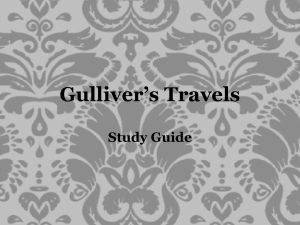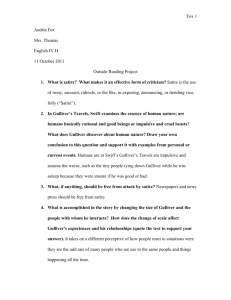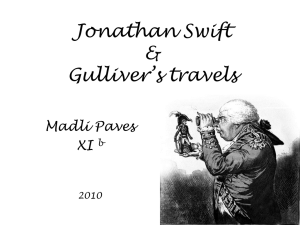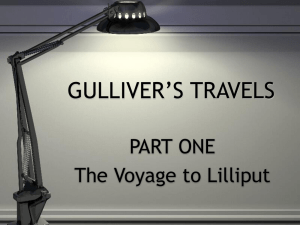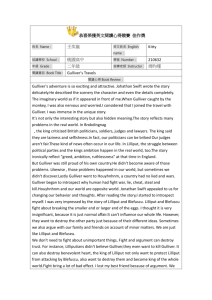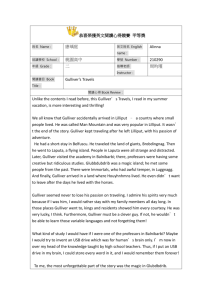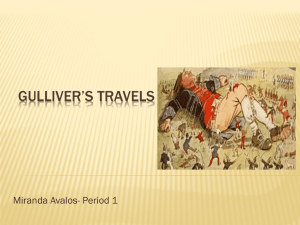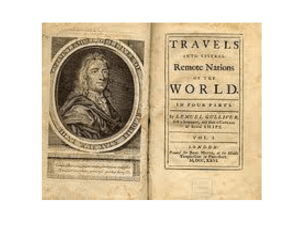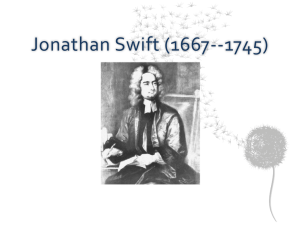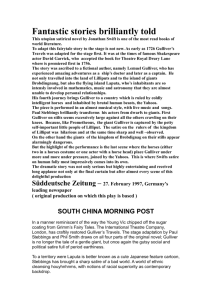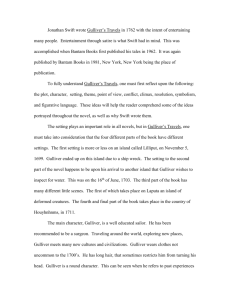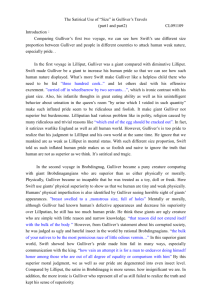Gulliver's Travels Satire Worksheet: Analyze Swift's Critique
advertisement
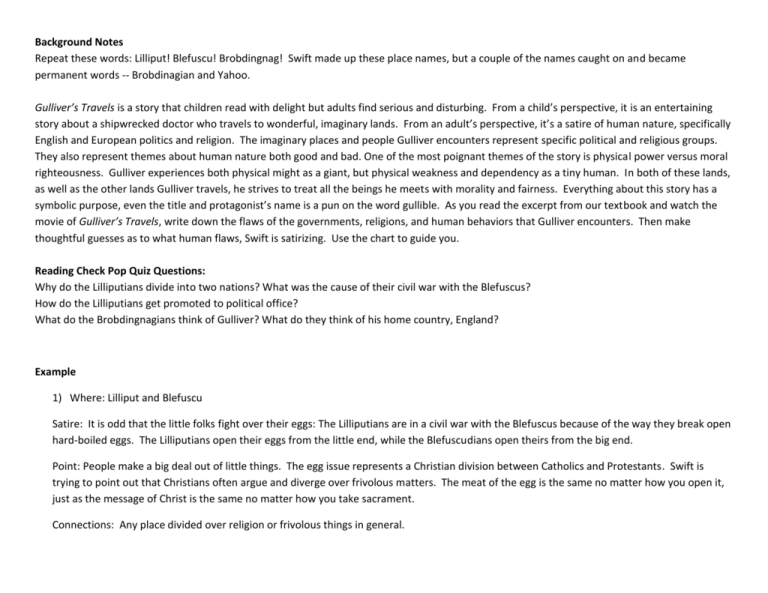
Background Notes Repeat these words: Lilliput! Blefuscu! Brobdingnag! Swift made up these place names, but a couple of the names caught on and became permanent words -- Brobdinagian and Yahoo. Gulliver’s Travels is a story that children read with delight but adults find serious and disturbing. From a child’s perspective, it is an entertaining story about a shipwrecked doctor who travels to wonderful, imaginary lands. From an adult’s perspective, it’s a satire of human nature, specifically English and European politics and religion. The imaginary places and people Gulliver encounters represent specific political and religious groups. They also represent themes about human nature both good and bad. One of the most poignant themes of the story is physical power versus moral righteousness. Gulliver experiences both physical might as a giant, but physical weakness and dependency as a tiny human. In both of these lands, as well as the other lands Gulliver travels, he strives to treat all the beings he meets with morality and fairness. Everything about this story has a symbolic purpose, even the title and protagonist’s name is a pun on the word gullible. As you read the excerpt from our textbook and watch the movie of Gulliver’s Travels, write down the flaws of the governments, religions, and human behaviors that Gulliver encounters. Then make thoughtful guesses as to what human flaws, Swift is satirizing. Use the chart to guide you. Reading Check Pop Quiz Questions: Why do the Lilliputians divide into two nations? What was the cause of their civil war with the Blefuscus? How do the Lilliputians get promoted to political office? What do the Brobdingnagians think of Gulliver? What do they think of his home country, England? Example 1) Where: Lilliput and Blefuscu Satire: It is odd that the little folks fight over their eggs: The Lilliputians are in a civil war with the Blefuscus because of the way they break open hard-boiled eggs. The Lilliputians open their eggs from the little end, while the Blefuscudians open theirs from the big end. Point: People make a big deal out of little things. The egg issue represents a Christian division between Catholics and Protestants. Swift is trying to point out that Christians often argue and diverge over frivolous matters. The meat of the egg is the same no matter how you open it, just as the message of Christ is the same no matter how you take sacrament. Connections: Any place divided over religion or frivolous things in general. Gulliver’s Travels p. 564-565 or 575-584 or 606 - 616 Name(s): ___________________________ ________________________ 1. A __________________ is a humorous imitation of a literary work or film that aims to point out the work’s shortcomings. Gulliver’s Travels is in part a ___________________ of early eighteenth-century travel books, which delighted in describing exotic places and people. 2. Provide a modern example of the above literary device here: ________________________________________________________________ _____________________________________________________________________ 3. “A Modest Proposal” and Gulliver’s Travels are both ________________. A _________________ is a literary work that uses irony, humor, overstatement, understatement, and exaggeration in general in order to point out vices, follies, or flaws of a person or group of people by making them seem ______________________. 4. The narrator of “A Modest Proposal” is mock earnest, which means he is pretending to be ___________________. 5. The narrator of Gulliver’s Travels is _____________ ______________, a doctor on a Royal Navy Ship who washes up on the shores of several fictional countries. Upon returning to England, he is painfully aware of his country’s flaws. The author,____________ ____________, wrote this story so that each of these made-up countries represents a real government with real problems. Directions: As you read/watch Gulliver’s Travels, write down the flaws of the governments, religions, and human behaviors that Gulliver encounters. Then make thoughtful guesses as to what human flaws, Swift is satirizing. Use the chart to guide you. Fictional Place -Where is Gulliver? Satire Think about overstatements, understatements, hyperboles, role reversals, and sarcasm What is odd about this place and its people? Point Connections What real place is like this today? What problem with humans behavior do you think Swift is pointing out? Land = Lilliput & Blefuscu Inhabitants = Lilliputians & Blefuscudians Land = Lilliput & Blefuscu Inhabitants = Lilliputians & Blefuscudians Find two more examples for this place. Land = Brobdingnag Inhabitants = Brobdingians Land = Floating island of Laputa Inhabitants = Laputans Land = Grand Academy of Balnibarbi Inhabitants = Balnibarbians Land = imprisonment of Glubbdubdrib Inhabitant= sorcerer Land = Luggnagg Inhabitants= the immortal Struldbruggs Land = Houyhnhnm Inhabitants = Houyhnhnms and Yahoos Land = England Inhabitants = real people, especially educated people like doctors & lawyers.
